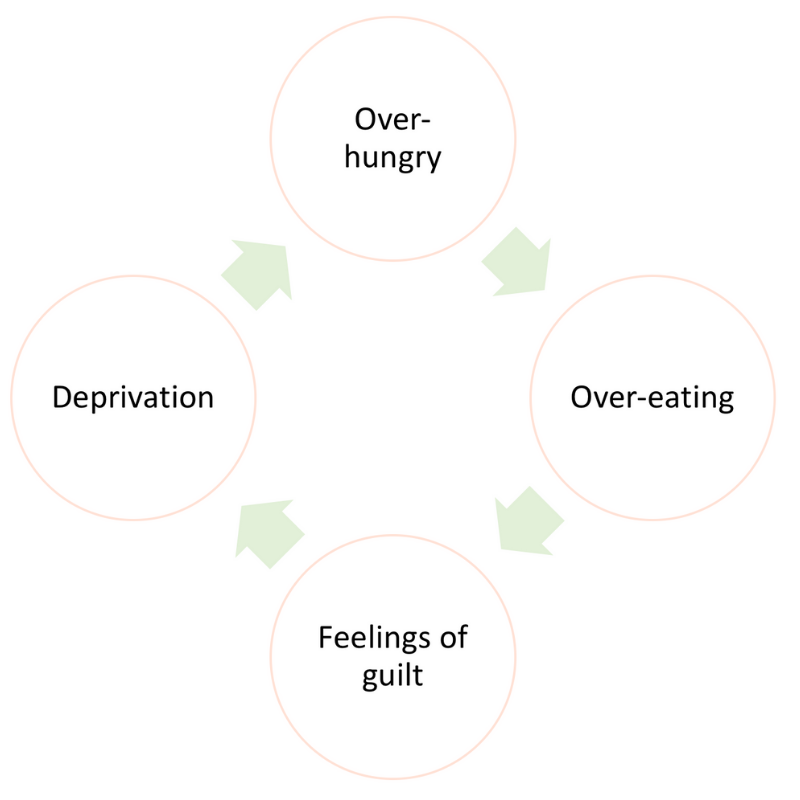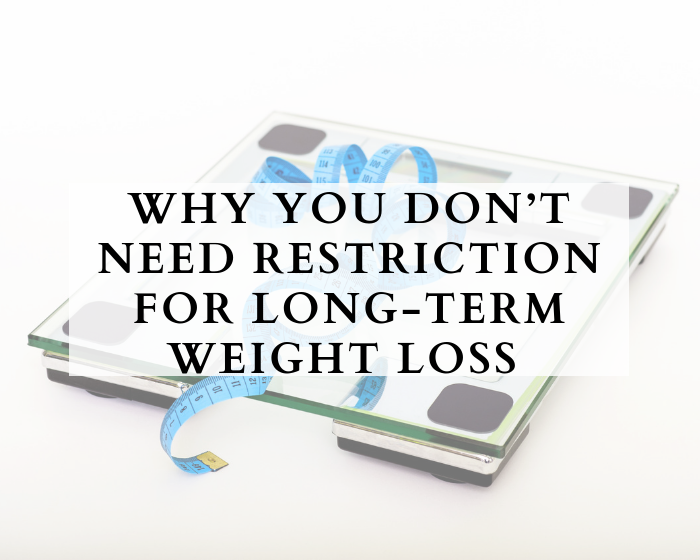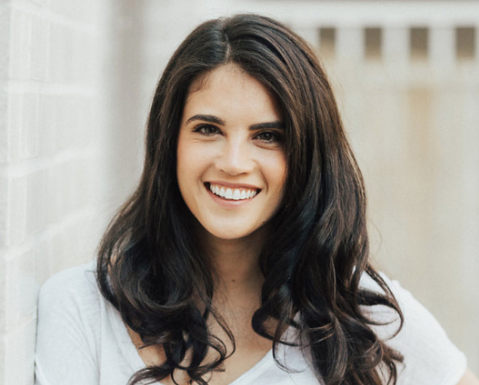Why You Don’t Need Restriction for Long-Term Weight Loss
January is full of resolutions to lose weight. But you don’t need restriction for long-term weight loss. Read on to find out why restrictive diets don’t work, and what to do instead.
We’re 9 days into National Dieting Month, are you a victim yet?
If that sounds extreme, I’m only saying it to drive home a point: restrictive dieting doesn’t work for long-term weight management.
But I get it – “quick fix” weight loss resolutions can be appealing. I know just how appealing because I was once there myself. I tried eating low carb and counting every calorie to keep it below a level I thought was necessary.
But if you’re like me and most, over time, these types of restrictive plans backfire.
This is why restrictive diet plans don’t work for long-term weight loss…
Over-restriction, under-eating, or deprivation eventually leads to over-eating, and possibly binging. Your willpower to avoid all cookies and cakes and ice cream on your keto plan just won’t win out.
And then when you finally give yourself permission to eat said gooey chocolate chip cookie, you won’t be able to stop at just one. You’ll eat one, then another, and likely another after that. Without the mindfulness to slow down and actually enjoy what you’re eating!
That’s when the guilt creeps in.
Do you know what I’m talking about? The “Why did I eat that?” “I ruined everything.” “I’m going to go to the gym for 3 hours between tonight and tomorrow to work it off.”
And do you know what happens next? You feel compelled to restrict again.
Let me skip ahead and tell you that after some time of restricting allllll the cookies and carbs again, this cycle will continue.
Under-eating or restricting your favorite foods simple isn’t sustainable for the long-term. You’ll get caught in the restriction à over-eating à guilt à back to restriction cycle. And it’s hard to get off.
Even more, in the process you’re harming your metabolism. This is going to make it even harder for you to achieve sustainable weight loss.
When you lower your caloric intake to less than what your body needs to survive, your resting metabolism also lowers itself to conserve energy (for the essentials: breathing, heart beating, thinking, etc.) and store fat.
This is why up to two-thirds of dieters regain the weight they lose… and potentially more!
But I get how tempting a quick fix weight loss solution can be. In fact, just last week I had a client who I’ve been working with for over 7 weeks ask me a question her husband asked her: “Why don’t you just go keto to lose the weight, and then learn to eat healthfully to maintain your weight loss?”
Sounds like a good idea right? You’ll lose the weight in a couple of weeks AND THEN your healthy HABITS can begin.
Studies point to big whopping that’s not how it works!
Like I mentioned, restrictive diets damage your metabolism. They make it HARDER for your body to lose weight (even post-partum). Additionally, your body undergoes hormonal adaptations when you severely cut calories that tells you to eat more. You literally feel less full.
Specifically, your body produces less leptin, a hormone that tells your brain you’re full, and more ghrelin, a hunger-promoting hormone. Low leptin levels, plus a low caloric intake, prompts a hormonal cascade, triggering another appetite stimulant hormone, neuropeptide Y.
I’m not sharing this to get all sciency on you, but to show you that PHYSIOLOGICALLY, you’re working against your body.
So now I know what you’re going to tell me… “But Chelsey, I’m not following a restrictive plan, I’m making healthy lifestyle changes.”
And I’m going to tell you that that’s AMAZING! I’m a big believer in healthy lifestyle changes that are sustainable for the long-term.
But I have 1 question for you first: does your “healthy lifestyle plan” require you to eliminate an entire food group – without medical necessity? Even just for 30 days?
Anytime a diet plan or “healthy lifestyle” encourages you to eliminate an ENTIRE food group without medical cause, I want you to think twice.
I repeat, you don’t need restriction for long-term weight loss.
And cutting dairy / gluten / carbs is RESTRICTION!
If you can’t see yourself eliminating an entire food group FOR THE REST OF YOUR LIFE, I don’t suggest you do it for even 30 days. It’s just not worth it, given how you now know your body will react.
What to do instead of a restrictive weight loss plan
So this year, instead of vowing to eliminate ALL sugar, dairy, grains, gluten, and carbs, let’s just not.
Instead, I encourage you to take a more balanced approach to eating in 2019.
Make sustainable behavior changes for maintainable health and weight loss results.
No, it’s not sexy. It’s not HOT. It’s not “the next new thing.”
But it works. And works, and works, and works… for the long-term.
You won’t only be able to drop the lbs if you’re looking to lose, but you’ll:
- Have more energy
- Feel better in your skin
- Stop obsessing about food
- Quit giving up your social life for your diet
- Still eat your favorite foods
- And more!
You’ll be able to feed your body when you feel hungry.
You’ll be able live a full life — dining out, traveling, socializing with friends – AND still fit in your jeans.
If you’re still unsure that you don’t need restriction for long-term weight loss, I hope you’ll read this article I wrote for SparkPeople discussing this even further. Learn about 5 reasons why restriction doesn’t work.
Is it OK to want to make changes to my body?
Absolutely!!
I understand the desire to make changes when you’re not happy with your body. I’m not telling you not to make changes.
I’m encouraging you to make thoughtful changes that will work for you, not just 30 days or even 3 months from now, but YEARS from now.
Learn about nutrition. Educate yourself. And set yourself up for success.
Working with a qualified registered dietitian who takes a sustainable approach to weight management can also help. I’m currently offering free initial consultations to see if working together will help you reach your health and wellness goals this year!
5 Ways to Lose Weight Without Restriction
So how do you lose weight without restriction?
It takes patience, and a lot more hard work than follow a quick fix diet plan, FYI. But here are 5 steps to get started:
-
Shift Your Mindset to Take a Balanced Approach to Health and Wellness
Eighty to 90% of the time, eat well-balanced meals with plenty of fiber-filled vegetables, fruit, whole grains, and protein to keep you satiated, plus healthy fats to promote satiety (AKA learn how to balance your plate).
The other 10-20% of the time, include room for mindful indulgences. Enjoy your favorite foods in a mindful manner, making deliberate decisions when you decide to eat dessert and your favorite foods. Planning for treats is an essential part of an overall healthy lifestyle so you don’t fall into the under-eating, over-eating, guilt cycle.
-
Make Sustainable Behavior Changes
Studies consistently prove that behavior change is essential for long-term health and wellness. By modulating the behaviors that influence your health, you’ll be able to overcome barriers to change and learn how to self-monitor for long-term success.
Working with a dietitian (like yours truly) that specializes in behavior change can be especially helpful.
Over time, you’ll adopt healthful habits that will help you reach your goals.
Remember, long-term successful weight loss and management is a marathon, not a sprint!
-
Eat When You Feel Hungry
Eating less won’t help you weigh less. There, I said it!
Studies found that eating 3 meals instead of 2 led to more satisfaction from food and reduced overall food intake. Yes, eating more improved appetite control and actually reduced hunger!
Your body is smarter than you think, but it needs to trust you too. Your body wants to trust that you’ll stop under-eating or skipping meals so you can stop over-eating later.
Substitute skipped meals with eating balanced meals and snacks with nutrient-rich ingredients, like vegetables, fruits, protein, healthy fats, and whole grains, when you feel hungry.
Personally, I find that most of my clients like to follow the 3 meals, 1-2 snacks pattern to quench their hunger safely and securely.
Become a client to feel good through food!
Start your day when you feel hungry (none of that fasting nonsense past your point of hunger!) with a balanced breakfast, like chia pudding for busy mornings, or a couple of egg muffins and a slice of whole grain toast with some mashed avocado.
Several hours later, you’ll probably feel hungry to get up from your desk and look for lunch. Again, choose a balanced meal, or something with protein, veggies, carbohydrates (preferably high fiber ones), and some healthy fats. Lately I’ve been loving my healthy tuna salad with cranberries with Flackers and sliced bell pepper on the side. (See, you don’t have to eat salads to be healthy, but salads can be satisfying too!)
When the 4pm itch crawls in, stop it in its tracks! Snacking is a healthy part of a well-balanced diet! If weight loss is your goal, snack wisely more often than not.
Here are some of my recent favorites:
- Chocolate Cherry Energy Bites (especially pre-workout!)
- Ants on a log (nut/seed butter on celery sticks with raisins)
- Popcorn snack mix (popcorn is a high fiber carbohydrate!)
- Dry roasted edamame (I always have these packs in my pantry)
- Greek yogurt or cottage cheese with berries
Then, when you’re hungry again after work, enjoy a well-balanced dinner, like these:
- Quick veggie-heavy stir fry
- Shrimp primavera with veggie noodles
- Turkey and spinach burgers (or black bean sweet potato burgers)
- Vegan lasagna (made with tofu ricotta!)
-
Add More Veggies to Your Plate
If you’re trying to eat more balanced, think about what you can ADD to your diet, not eliminate.
One of the easiest foods you can add more of is vegetables! I promise they taste DELICIOUS when prepared properly!
- Don’t make a boring salad ever again. Make a healthy and satisfying bowl!
- Stop forcing yourself to eat broccoli because you think you “should.” Find a vegetable you actually love. (HINT: sometimes it takes several tries!)
Here are some of my favorite veggie-heavy recipes that all take less than 30 minutes to prepare:
- Simple Roasted Carrots (they get extra sweet when roasted)
- 3-Ingredient Egg Bake (a great way to add veggies to breakfast)
- Portobello Mushroom Cap Pizzas (satisfy your pizza cravings with more veggies in your day!)
-
Make Room For Your Favorite Foods
Pizza, ice cream, french fries, chocolate, cookies, croissants… life would be boring without these more indulgent foods. They may not overtly provide tons of nutrients, but they’re healthy for your soul and mental health.
Think about it… what happens when you tell yourself you can’t eat dessert? Dessert after every meal starts SCREAMING your name! If you don’t get a chocolate fix ASAP you feel like you’re going to implode. Remember, willpower will only last so long!
Dieting makes you hyperaware of what you’re missing. As it is, you make over 200 food-related decisions a day. Add restriction to the equation and you’re thinking about food and testing your willpower more than before.
If eating more indulgent foods triggers feelings of guilt, I urge you to explore that. When did these feelings start? (It may be years.) Why do you feel guilty when you eat these foods?
To lessen these feelings, catch yourself every time you call a food “bad.” Food cannot inherently be good or bad. When you believe this in your core, you’ll be able to stop feeling guilty when you eat more indulgent, less nutritious foods.
If you want help getting to this place, work with a trained professional who can help you see that all foods can fit in a healthy, well-balanced diet (while you still fit in your jeans).
The Takeaways…
As you can see, restriction is not the long-term solution.
Make it easier for yourself in 2019 and work with a dietitian who can give you the tools for your toolbox so you can always feel your best! Learn to balance your plate and finally answer the question “What should I eat?”
For the month of January, I’m offering a 4-pack of 1-on-1 virtual sessions with me for just $249! That’s over $100 savings off my regular pricing! Click here to start working together!
Let’s make 2019 YOUR year to feel your best!
XO







 Hi there!
Thanks for stopping by! I'm Chelsey, an online Registered Dietitian, recipe developer, budding photographer, and coffee addict! My mission is to help you feel good through food by answering the question "What should I eat?" Let's make nutrition approachable!
I hope you enjoy my personal collection of simple, healthy, food allergy friendly and nutritiously delicious recipes, plus tips and tons of tricks that will help YOU live a nutritionally-balanced life! I look forward to getting to know you better...
Hi there!
Thanks for stopping by! I'm Chelsey, an online Registered Dietitian, recipe developer, budding photographer, and coffee addict! My mission is to help you feel good through food by answering the question "What should I eat?" Let's make nutrition approachable!
I hope you enjoy my personal collection of simple, healthy, food allergy friendly and nutritiously delicious recipes, plus tips and tons of tricks that will help YOU live a nutritionally-balanced life! I look forward to getting to know you better...








